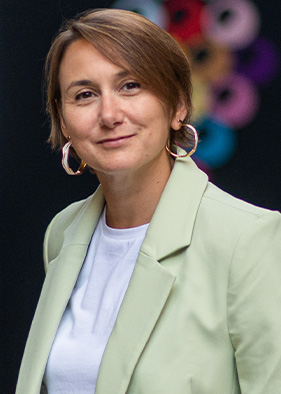April 2025, Year XVII, no. 4
Nicola Bates
A toast to British wine
“It’s only in the past few years that the world has begun to fully appreciate the quality of our wines. Sales are growing along with production.”
Telos: You have joined WineGB for a little more than a year. Can you tell us more about the association?
Nicola Bates: WineGB is the voice of the Great British wine sector. We represent, lead and support its sustainable growth. We represent the sector to the Government, media and trade. Our 500+ growers and producer members secure practical measures to help them to produce and sell their wines. This includes our 5 steps to supporting our businesses to thrive: Networks, bringing the sector together at events and through our regular communications. We connect expert service provider advice with peers within the vineyard, winery and cellar door. Education, through articles, guidances, toolkits, webinars and face to face connection we are training the people who drive forward UK wines. We also invest in research, to better understand our sector and support productivity innovations through cross body industry research bids and programmes. Currently we are part of research into frost and robotics. Standard setting, through our Sustainable Wines of Great Britian certification, launched just four years ago, over 43% of UK hectarage is now able to show that it is lowering its carbon in the vineyard and winery. We also manage the PDO (protected designation of origin) and PGI (protected geographical indication) for English and Welsh wines that allow the sector to prove to consumers that they have set the standards for production expected. Marketing support, through our awards, export promotions, trade tasting, education, and English Wine Week campaign we increase category wide awareness to drive sales. Political and media representation, making the case for our sector specific needs through the media and directly to politicians. Through our public consultation responses and in person engagement we show how politics can support us.
There are few countries in the world that can match the level of growth seen in the UK wine industry over the last five years - a 75% increase in vineyard plantings between 2018 and 2022, making it the fastest growing agricultural sector in the UK. What are the reasons for such a growth?
It’s only in the past few years that the world has begun to fully appreciate the quality of our wines. Sales are growing along with production. In 2018 we were selling 3.3 million bottles of wine and in 2023 we sold 8.8 million bottles, and 8% of these to export (a doubling from 2021). Visits to our vineyards increased by over 50% from under 1 million in 2021 to 1.5 million. Our ambitions are large and the appetite clear from consumers who are still discovering British wines. Having been a global wine hub for centuries there is an appreciation of the wine trade and an excitement from farmers and traders in being able to take part in domestic production. Undoubtedly the hard work of members has been a principal driver in developing the market. The investment in making high quality wines, building facilities, securing distribution, developing marketing has been a sharp ramp up from the original pioneers that were most typical of the sector ten years ago. More individuals are now seeing this as long-term growth businesses where they want to break out of the local economy to national recognition. These companies are providing a halo effect for the smaller businesses, which make up the vast majority of our membership, so they can walk into local pubs, bars, restaurants and markets and find a ready market of interested buyers. It is also fair to say that we have played our role in supporting sector growth, especially during painful periods such as the pandemic.
Yet you do not seem satisfied and have even drafted a Manifesto for Growth. Would you like to tell us about it?
Systematic government engagement is still a very new activity for WineGB. The Manifesto for Growth is the first time the sector has given a comprehensive assessment of all of our needs. I’ll give you a couple of examples as to the areas of action the government can take to help us. Fairer business. The cost of UK production is higher as yields are lower (being on the border of where wines can be made) and the cost of business in the UK is higher with increased costs of capital; the need to invest into market development and distribution; labour costs; and the highest duty for a domestic producing nation in the world. What about the inheritance taxes for farmers hitting many of our firms? Reducing overall business costs is key. Along with cuts to alcohol duty and specifics to support domestic producers with a relief at the cellar door to encourage wine tourism. To value British. The Government should actively support British wine’s growth, including consumer knowledge of our products, both at home and abroad. By coming together, we are able to make the case so that political parties understand precisely how they can help to ensure more high skilled rural jobs across the whole of the UK.
What are the battles that ‘the UK wine lobbyist’ is facing?
All industries in the UK face considerable challenges from the real economy and our insurgent wine sector is no different. However, all new wine sectors that have been successful have had substantial support; this doesn’t currently exist in the UK. And there is an urgency to act. English and Welsh wine is currently on trend, and when the world starts paying attention it is important to ride the wave. There is a risk that due to short term balance sheet savings, the overall opportunity is lost. There are three areas worth noting: 1) From a global perspective trade wars are not conducive to business and any activity that the Government can do to ensure that tariffs are not raised is important for our US exports; 2) The UK Government is looking at spending cuts across departments, and has restricted grants that our farmers use. Our sector would benefit from considerable support for marketing, but calls for this occur at a time when spend has reduced over a decade and the Department for Business is reviewing all expenditure; 3) Finally ensuring that the review of EU regulations supports the needs of the sector is important and ensuring that our government values British businesses. This means protection of our country naming to avoid consumer confusion and measures that allow more wine on shelf.
Marco Sonsini
Editorial
With the multicultural metropolis of London, the prestigious universities of Oxford and Cambridge, the White Cliffs of Dover, the green hills of Wales, we can safely say that Great Britain is full of stunning landscapes, of history, of literary culture and, to the amazement of many, even some unexpected oenological surprises that, until a few decades ago, we never would have imagined. The English are better remembered in this area for their skills in commerce. Since ancient times, the English have been crossing seas in their merchant ships, while simultaneously seeking the best nectars on the planet (liqueurs like Port, Madeira and our Marsala), making London one of the undisputed capitals of wine. Historically, because of its cold climate, England has not naturally been associated with winemaking. However, climate change has moved world viticulture further and further north.
So, there is English wine and it has a story to tell. Who better to tell it than our guest in the April issue of PRIMOPIANOSCALAc, Nicola Bates, CEO of Wines of Great Britain (WineGB)?
“It’s only in the past few years that the world has begun to fully appreciate the quality of our wines. Sales are growing along with production. In 2018 we were selling 3.3 million bottles of wine and in 2023 we sold 8.8 million bottles, and 8% of these to export (a doubling from 2021). Visits to our vineyards increased by over 50% from under 1 million in 2021 to 1.5 million.”
Nevertheless, this exponential growth has brought many obstacles, especially legislative obstacles, to the surface, preventing this sector from levelling up. So, for the very first time, the association that represents English and Welsh winemakers decided to do some real lobbying and drafted the ‘Manifesto for Growth’ during the recent general elections identifying three problems that the British institutions need to solve if they want this sector to grow. Bates proved she has skill and a long-term vision, and the lobbying the association is doing for the first time so professionally and precisely satisfies at least two of the requirements of a good lobbyist: to be timely (what better opportunity to catch politicians’ attention than the elections!) and concise (no vague complaints, but rather problems accompanied by solutions). Just read the interview to find out what they are.
I’ll even add another new problem emerging for Bates: US tariffs, which will deal a deadly blow to the sector. Though, she finds valid allies in winemakers from all over the world, Italy included. The economists at Nomisma predict that the impact of the tariffs imposed by Trump to date will be significant. One example, they believe to be even underestimated, is the case of Tuscan still red wines, now exported at the average price of 12 euros per litre (2024). Before the tariffs, they cost 12.06 euros by the time they got to their destination, but now with the new measures, when they cross the border, they will cost 14.40 euros a litre. Let’s just hope that, in one way or another, we can avoid a trade war.
Even in April we remain faithful to PRIMOPIANOSCALAc’s new 2025 cover graphics in Telos A&S’s traditional colours: red, black and white. We reveal our guests’ identity by showing half of their face on one side and a quote from the interview on the other. Their name is written in Abil Fatface, a classy font inspired by 19th-century European advertising posters.
Mariella Palazzolo

Nicola Bates is the CEO of Wines of Great Britain (WineGB), the trade association representing the vineyards and wine makers of Great Britain. Previously she was Director of Strategy and External Affairs at the Portman Group, the UK social responsibility body and regulator for alcohol labelling, packaging and promotion. From 2010 to 2018 Nicola worked at Ellwood Atfiled, a leading head-hunting and executive recruitment agency. There she started as a recruitment consultant, then head of public affairs and policy recruitment, eventually reaching the role of Board Director. Bates stood as a candidate for the Conservative party in the UK’s 2010 General Election, coming second to then-Liberal Democrat leader Nick Clegg in the Sheffield Hallam constituency.
Nicola was educated at the University of York, where she majored in Politics.
She has two daughters, a cat, dog and husband so she relaxes with practicing yoga, reading literature and watching ballet.
Marco Sonsini







SocialTelos